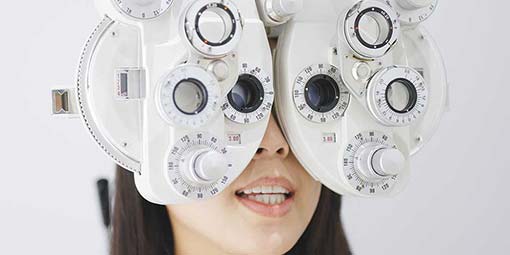The Differences Between Optometrists, Ophthamologists and Opticians
11-08-2016
Comparing Eye Care Professionals
A common question among both healthcare professionals and the general public alike is, What is the difference between a doctor of optometry (optometrist), an ophthalmologist and an optician? While all three professions focus on eye care, in Canada and United States the levels of training, expertise and the core competencies are significantly different for each type of eye care provider.What is an Optometrist?
Optometrists (Doctors of Optometry). Optometrists, or Doctors of Optometry, are the primary healthcare provider when it comes to vision and eye health. An optometrist holds a Bachelor of Science degree or higher and a four-year doctor of optometry degree from an accredited university’s or college's school of optometry. Some optometrists also possess a residency at a university or college hospital. A optometrist is highly educated, clinically trained and licensed to deliver the best standard of comprehensive primary eye care. Your optometrist can:- Provide an eye exam to examine, assess, measure and diagnose disorders and diseases within the human eye and visual system, such as glaucoma, cataracts and macular degeneration;
- Diagnose and co-manage systemic conditions, such as diabetes (See Diabetic Eye Exams), high blood pressure and brain tumors;
- Prescribe corrective lenses;
- Fit and dispense eyewear, including glasses, sunglasses, contact lenses, safety eyewear and low-vision aids;
- Prescribe medications (this varies by province so ask your optometrist for details);
- Remove foreign bodies from the eye;
- Refer patients to secondary specialists, such as ophthalmologists, for treatment of systemic disease, or eye surgery;
- Co-manage pre- and post-operative care for laser vision correction; and Co-manage eye diseases with ophthalmologists
What is an Ophthalmologist?
Ophthalmologists. Ophthalmologists are surgeons and specialists in diagnosing and treating eye disease. They possess a Bachelor Degree, four years of medical school at an accredited university and a residency in medical and surgical care of the eyes at an accredited university or college hospital. Ophthalmologists are secondary-level healthcare providers - patients usually require a referral from their optometrist to obtain an appointment for medical or surgical treatment, or a surgical consult.What is an Optician?
Opticians. Opticians are the third member of the eye care team. In Canada, they are trained through a college program to fabricate and fit vision aids, such as glasses, based on the prescription of an optometrist. Opticians are licensed to dispense spectacles, contact lenses and other optical aids. They are not qualified to assess, diagnose, or treat eye conditions, nor can they check or write prescriptions for eyeglasses or contact lenses.Schedule an an eye exam with an optometrist today!
Schedule An Appointment
Adult Eye Exams
Our advanced eye exams consist of 25+ modern tests and digital scans to assess eye health, function, and visual acuity.

Child Eye Exams
Give your child a clear future with an annual eye exam from our experienced Edmonton optometrists.

Senior Eye Exams
Maintain your vision through your golden years with gold standard eye care from the optometrists at our Edmonton eye clinic.

Contact Lens Eye Exams
Our eye exams for contact lens wearers include test and digital scans to assess eye health, function, visual acuity, and lens fit.

Diabetic Eye Exams
Managing diabetes requires regular eye exams to ensure that diabetes is not causing irreversible vision loss.

Dilated Eye Exams
Dilating the eyes enables our Edmonton optometrists to see more of the eye so that you many never see less.
Our Edmonton Eye Exams Are Comprised Of 4 Phases Of Evaluation

1. Eye Exam Pre-Testing
Corneal Thickness | Intraocular Pressures | Visual Field
Pre-testing is a detailed process that gathers all necessary information for the optometrist in advance of the optometrist-administered eye examination. This process involves completing a detailed patient history, as well as a series of standard tests. Pre-testing is an essential part of the comprehensive eye exam process, providing valuable information and visuals for both the optometrist and the patient.
More About Pre-Testing »
2. Advanced Diagnostic Testing
Retinal Photography, OCT, Topography
eye-deology Vision Care differentiates itself from other clinics by having the most advanced modern diagnostic specialty testing equipment. Specialty equipment, such as a wide-angle high-resolution retinal imager, Optical Coherence Tomography (OCT), Humphrey Visual Field Analyzer and corneal topographer, ensures that patients receive the best comprehensive eye care.
More About Advanced Testing »
3. Optometrist Examination
Health Assessment & Disease Diagnosis
eye-deology Vision Care Edmonton optometrists perform a multitude of tests and assessments to evaluate ocular health, eye coordination, and visual acuity. In addition, they also evaluate the results of the tests and scans performed during pre-testing. As part of patient education, our optometrists also take the time to show and explain results to patients.
More About Doctor Exam »
4. Eye Glass Consult
Prescription | Lens Selection | Digital Fitting
If you require corrective lenses to improve your vision, our licensed opticians will customize their fit to your unique attributes, needs, lifestyle, and budget. Our opticians are happy to provide you with information about the latest eyeglass frame and lens technologies available so you can make informed decisions and begin seeing and looking your best.
More About Eyewear Consult »